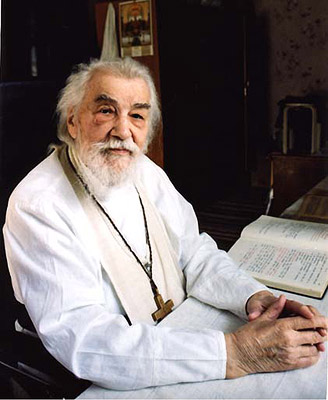 Мany people think it is very hard to live the faith and do God’s will. In fact it is very easy. All we have to do is pay attention to the details, to the little things, and try not to sin in the smallest and easiest things.
Мany people think it is very hard to live the faith and do God’s will. In fact it is very easy. All we have to do is pay attention to the details, to the little things, and try not to sin in the smallest and easiest things.
This is the simplest and easiest way to enter into the spiritual world and draw near to God.
Usually people think that the Maker demands very great works, the most extreme self-sacrifice, the annihilation of their own personalities. People are so frightened by these thoughts that they even start to fear being near to God, they hide, like Adam who sinned, and they do not even read the word of God. They think: ‘I’ll never be able to do anything for God and for my soul in any case, so it‘s better if I keep away from anything spiritual, I won’t think about eternal life, about God, and I’ll take life as it comes’.
On the very threshold of religious life there exists a sort of ‘hypnosis of the important things’, ‘we must do some great deed – or else nothing’. And people do not do anything for God or for their souls. It is amazing: the more people give themselves up to the little things in life, the less they want to be honest, pure and faithful to God, precisely in those little things. And yet anyone who wants to draw near to the Kingdom of God must have the right approach to the little things.
‘He who wants to draw near’ – this is precisely where the whole difficulty of human approaches to religion is concealed. Usually people want to enter into the Kingdom of Heaven in ways which are quite unexpected for them, magically and miraculously, or, more exactly, through some sort of spiritual exploit. But neither the former nor the latter is the right way to find the spiritual world.
We do not draw near to God in a magical and miraculous way, remaining here on earth, strangers to the interests of the Kingdom of God, we do not buy the values of the Kingdom of God with some sort of outward deeds. Deeds are necessary for spiritual life, a heavenly psychology, an enlightened will, a desire for good, a just and pure heart and unfeigned love must be grafted onto us. It is precisely through the little things of everyday life that all this can be grafted onto us and take root in us.
Little good deeds are water for the flower of the human personality. There is absolutely no need to pour an ocean of water onto a thirsty flower. You can give it half a cupful, that is enough for life and it will play a very important role in its life.
A hungry person, even someone who has not eaten for a very long time does not need to eat a truckload of bread, half a loaf is enough for his body to recover. Life itself provides us with amazing parallels and examples of the importance of little things. In the medical field, which deals with small and strictly limited doses of medicine, there is a whole field of homeopathy which advocates only tiny amounts of medication. This is on the basis that our bodies themselves produce extraordinarily small amounts of substances which are precious for them and these are quite enough to support them and give them good health.
I would like to draw everyone’s close attention to the very little things, which are easy to do and yet extraordinarily necessary.
‘Whosoever shall give to drink unto one of these little ones a cup of cold water only in the name of a disciple, verily I say unto you, he shall in no wise lose his reward’. These words of our Lord express the supreme importance of good in little things. ‘A cup of water’ is not much. In the time of the Saviour, Palestine was not a desert, as it is today; it was a flourishing, well-watered land and a cup of water, though small, was of course more or less precious at a time when people mainly went everywhere on foot. But in saying this, the Lord does not restrict Himself to just a small cup of water. He even adds that it may be given only ‘in the name of a disciple’. This is a remarkable detail. And we should examine it carefully. The best things in life are always things in the Name of Christ, in the Name of the Lord.
‘Blessed is he that comes – in any sense – in the name of the Lord’. The Spirit, the Name of Christ bestows on all things and deeds an eternal value, however little those deeds may be.
Simple, human sacrificial love, which always reflects the love of Christ, makes every human word, every human gesture, every human tear, every human smile, every human look significant and precious. And here the Lord says clearly that a little good deed done not even in His Name, but only in the name of a disciple, already has great value in eternity. ‘In the name of a disciple’ – this is the boundary of the link with His Spirit, His deed, His life…
It is after all clear that our deeds can be and often are selfish, inherently self-interested. The Lord indicates this to us, He advises us to invite into our homes not those who can then extend the same invitation to us, but to invite those who need our help, support and consolation. Sometimes our guests spread vain talk, evil gossip and all sorts of futile nonsense. But there can be nice, friendly conversations, a communion of souls, this is blessed, this strengthens the soul, fortifying in it goodness and truth. However, the worship of insincere worldly contacts is a disease which infects other people and ourselves and which is today destroying civilization.
Any human contact must inevitably be touched by the good Spirit of Christ, by His appearance, either overtly or else covertly. The covert presence of the Spirit of God in kind and simple human communion of souls is that atmosphere of ‘discipleship’, of which our Lord speaks. ‘In the name of a disciple’ is the very first stage in our communion with others in the name of our Lord Jesus Christ Himself…
Many who do not yet know the Lord and the wonderful communion with Him already have among themselves this disinterested and pure communion of souls, which draws them towards the Spirit of Christ. And many may be at this first stage of good, of which the Lord spoke as of giving a cupful of water ‘only in the name of a disciple’. More exactly everyone is there. So it is also correct to understand these words of Christ literally and try and help everyone. Not a single instant of such communion is forgotten before God, just as ‘not one sparrow is forgotten before your Heavenly Father’ (Lk 12, 6).
If people were wise, they would all strive to do little but very easy deeds, through which they could receive eternal treasures for themselves. The great salvation for people is that they can graft themselves onto the trunk of the eternal tree of life through even the smallest cutting – a good deed. There is no need to graft the whole trunk of a good apple-tree onto a wild one. All you need to do is to take a small cutting and graft it on to one of the twigs of a wild apple-tree. Similarly there is no need to mix a huge amount of leavened dough with a similar amount of unleavened dough to make it rise. All you need do is add a very small amount of yeast to the unleavened and the whole lot will rise. It is the same thing with little things. The tiniest thing can have a huge effect. This is why we must not neglect the little things in doing good and say to ourselves: ‘I can’t do anything big, so I won’t bother to do any good at all’.
How useful even the smallest good deed is for us is proved beyond doubt by the fact that even the smallest evil is extraordinarily harmful to us. Let us say that a speck of dust has fallen into our eye –our eye can no longer see anything and at the same time it even becomes hard to see anything with the other eye. A small evil which has fallen like a speck of dust into the soul’s eye puts us completely out of action. It is a tiny matter to remove a speck of dust from our bodily eye or our soul’s eye, or from someone else’s, but it is a good deed without which we cannot live.
Indeed, a little good deed is more vital, more essential in this world than a great one. We can live without a great good deed, but not without a little one. Humanity will perish not from a lack of little good deeds, but precisely from a lack of little good deeds. A great good deed is only the roof which is placed on the walls and they are are made up of little bricks.
So the Maker left us on earth to do little, very easy, good deeds, having taken on Himself all the great good deeds. And here, through those who do the little deeds, the Lord does the great deeds. The Maker Himself makes our ‘little deeds’ into His great deeds, for our Lord is the Maker, Who made everything from nothing, all the more therefore He can make little into great. But the air and the earth resist even the slightest upward movement. Human inertia resists even the smallest and easiest good deed. The Savior exposed this inertia in his short parable: ‘No man also having drunk old wine straightway desireth new: for he saith, the old is better (Lk 5, 39). Anyone who lives in the world is attached to the ordinary and routine. If someone is attached to evil, he thinks it is a normal and natural state and he considers good to be unnatural, oppressive, too much of a burden for him. If someone is attached to good, then he does not do it because he needs to, but because he cannot help doing it, just as he cannot help breathing and a bird cannot help flying.
A person who has a kind nature first of all strengthens and consoles himself. This is not at all selfishness, as some unjustly assert, no, this is the true expression of disinterested good, when it brings higher spiritual joy to him who has done it. True good is always a profound and pure consolation for those who unite their souls with it. It is impossible not to be happy when you come out of a dark underground prison into the light and see the pure green of nature and smell the flowers. We must not shout out to people: ‘You’re selfish, you take pleasure in the good you do’. This is the only selfless joy, the joy of good, the joy of the Kingdom of God. And people will be saved from evil through this joy, they will live with God for ever.
For those who have not experienced real good, this sometimes seems to be a futile torment which no-one needs… There is a state of false peace which it is difficult to get out of. Just as it is hard for a baby to get out of its mother’s womb into the world, so it is hard for ‘baby-people’ to get out of their petty feelings and thoughts, which are directed only at obtaining selfish advantages and who are unable to feel concerned for anyone who is not linked to them.
Here is the conviction that the old, the familiar and the routine are always better than the new and the unfamiliar, a conviction inherent to every unenlightened person. Only those who have begun to grow, to tread the path of thirsting for the Righteousness of Christ and spiritual humility, only they stop regretting their inertia, the immobility of the dreams which they have acquired in life and which they cherish in life…It is hard for people to break out of the routine. In this way, perhaps in part they preserve themselves from unbridled insolence and evil. The stability of our legs in a marsh sometimes prevents us from falling headlong into an abyss. But more often it is the marsh that prevents us from going up to the mountain where we may see God, or at least getting out onto firm ground where we can obey the word of God…
However, through doing the little things, the easy things, those which are done with the greatest of ease, we can most of all get used to good and start to serve it, reluctantly, but from the heart, sincerely, and in this way enter ever more into the atmosphere of good, putting down the roots of our life into the new earth of good. The roots of human life adapt easily to this earth of good and soon cannot live without it…So we are saved: from little comes great. He who is ‘faithful in that which is least’ turns out to be faithful in that which is much.
This is why I now sing the praises not of good, but of its insignificance, its smallness. And not only do I not reproach you for being engaged in doing good only in the little things and for not making some great self-sacrifice but, on the contrary, I ask you not to think about some great self-sacrifice and that you in no way neglect to do good in the little things.
If you want, by all means, fall into a rage with regard to some special case, but do not be angry because of some little detail, do not be angry ‘with your brother without a cause’ (Matt. 5, 22).
Invent some lie in some exceptional case, but do not tell your neighbour untruths in your everyday life. This is a detail, it is petty, insignificant, but try to carry this out and you will see what will come of it.
Leave aside all your musings; are we or are we not allowed to kill millions of people – women, children and old men – try to show your moral feeling in the little things: never kill your neighbour’s personality, neither in word, nor hint, nor gesture. After all it is good to restrain yourself from evil…and here, in the details, you will achieve a great deal, easily, unnoticeably and in a practical way for yourself.
It is hard to get up to pray at night. But enter into prayer in the morning, if you cannot do this at home, then as you go to work, when your thought is free, enter into ‘Our Father’ and let your heart respond to every word of that short prayer. And at night, making the sign of the cross, give yourself up into the hands of the Heavenly Father with your whole heart…That is very easy…
And give water, give water to all those who need it, give a cup, filled with the simplest sympathy towards anyone who needs it. There are whole rivers of this water everywhere, do not be afraid, it will not be short, each of you draw a cup of it.
I sing your praises, amazing path of ‘little things!’ Surround yourselves, people, gird yourselves, with little good deeds – a chain of little, simple, easy good feelings, thoughts, words and deeds – they cost you nothing. Let us leave what is great and hard, that is for those who love that, but for us who have not yet come to love the great things, the Lord in His mercy has prepared, pouring it out everywhere like the water and the air, the little love.
St Petersburg Diocesan News (1990, No 1, Pp 27-29)
Translated from Russian by Fr. Andrew Phillips



















